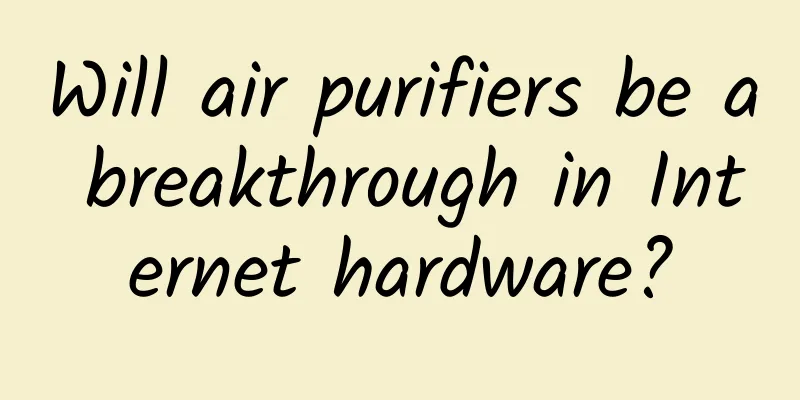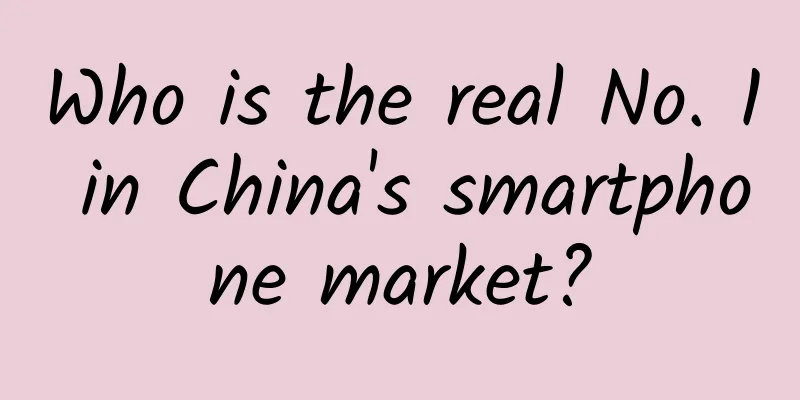Will air purifiers be a breakthrough in Internet hardware?

|
2013 is known as the first year of the explosion of smart hardware. At that time, smart watches, smart bracelets, smart glasses, virtual reality devices, wearable medical devices, smart homes and other hardware products emerged in an endless stream. Although the prospects of smart hardware seem to be very bright, a year has passed and these prosperous scenes have only put the concept into practice. However, it is difficult to combine software and hardware, and it has not been able to fully grasp the pain points of users. As the recent severe pollution caused by smog continues, people have become particularly concerned about air quality and living environment, and smart air purifiers have become popular in the smart hardware circle. However, whether it can become a real breakthrough in Internet hardware is still to be verified, just like those smart hardware that are popular for a while but have not completely solved the pain points of users. Although smart air purifiers have great opportunities by addressing users' basic needs, if they want to become a true Internet hardware portal, they also need to build an integrated solution of hardware, software, and big data around the product itself, and meet the needs of mass consumers at an acceptable and transparent price. Air purifiers are gradually becoming a rigid demand for consumers The severe smog weather has caused a term popular among foreigners - "Beijing cough" to draw people's special attention to air pollution and health. This slightly joking imported term has made air purifiers go from "obscurity" to "overnight fame", and "air purification" has gradually become a rigid demand. Relevant monitoring data show that the sales of air purifiers in the online market increased by 123.3% month-on-month in early October this year. The data of the "2013-2017 China Air Purifier Market Demand Forecast and Investment Strategy Planning Analysis Report" also shows that the sales volume of air purifiers in my country will maintain a high growth rate of 30%-35% in the future. It is expected that the scale of my country's air purifier market may exceed 60 billion yuan by 2015 and reach more than 100 billion yuan in 2017. The attraction of huge market potential, coupled with Google's acquisition of Nest for a high price of US$3.2 billion, has prompted a large number of domestic smart appliance entrepreneurship booms. Domestic home appliance manufacturers, Internet companies, and smart hardware entrepreneurs have increased their investment in air purifier products. Investment cases for smart air purifiers continue. Near, a smart hardware innovation team in Shanghai, recently received a million-yuan investment from an angel fund in Beijing; Langkong, another emerging smart hardware company, received tens of millions of yuan in Pre-A round investment after receiving angel round financing from angel investors Yang Ning , Sheng Xitai and Lebo Capital; in September, "Three Dads", an air purifier specifically for children, also announced that it had received a $10 million A round investment from investor Zhang Zhen, partner of Gaorong Capital. Traditional home appliance manufacturers and Internet companies did not miss this opportunity. 360 and TCL jointly launched the T3 Air Guardian, Haier launched a smart air purifier as part of its "U+ Smart Life Operating System", and there are reports that Xiaomi will release a large air purifier at the end of the month. Don’t let “intelligence” become a gimmick It seems that the market for smart air purifiers is indeed huge, but the endless variety of products lack a unified standard, resulting in a "mixed bag" of products in the market: consumers are not clear about the market, prices vary, and even many products are just empty shells with "smart" features. As Liu Rui, the founder of Langkong Technology, said, this is a "hard-to-find market with pain points everywhere, but no one has solved it in depth." Liu Rui introduced that some silent ion wind purifiers on the market have poor purification capabilities; filter air purifiers have high consumables and maintenance costs; some imported air purifiers have high purification capabilities, but the prices and cost of replacing filters are unaffordable for consumers; there is also a lack of exaggerated products that are taking advantage of the market. In addition to poor quality and high cost of consumables, many so-called smart air purifiers are not truly intelligent. Connecting to WiFi, remote control via APP, automatic detection system, automatic startup system, or accessing accounts and social functions, purifiers have their own unique capabilities in the concept of intelligence. The reason why a certain air purifier is called smart is simply that it can automatically shut down after running for eight hours. Tong Yuan, chief operating officer of Zhongke Yutu, told Tencent Technology that most so-called "smart" air purifiers on the market can only be remotely controlled by APP, but to truly achieve intelligence, it is necessary not only to monitor humidity, temperature, PM2.5, VOC (toluene, xylene) and other data, but the most important thing is to look at the filtration effect. There are two main types of filtration methods for purifiers on the market. One is electrostatic adsorption, which does not require filter replacement, but is more expensive; the other is HEPA (high-efficiency particulate air) filter, which is cheaper but requires regular filter replacement. In response to this, Liu Rui adopted a balanced solution: the first two layers of filters use electrostatic adsorption, and the last four layers use HEPA filters, which reduces costs while ensuring filtering effects. Big data is the core entrance In addition, the purifier needs to achieve the function of autonomous detection and air purification through comprehensive sensor fusion technology. In other words, the use, display and interaction of the purifier should be humanized, rather than mechanical and digital. The perception, learning and purification of the environment should also be autonomous and automatic, "just like an extension of human organs," said Liu Rui. The core of all this is data. Without data, it is difficult for air purifiers to automatically adjust according to environmental changes. With big data as a foundation, air purifiers can determine what is the appropriate temperature based on past data, what humidity should be lowered to alarm, and so on. For example, the Microinsurance smart air purifier uses a WiFi function module to communicate data and information with the Internet cloud through a mobile terminal APP, collect and analyze big data, and control air quality anytime and anywhere. Among them, the automatic mode of the air purifier can also automatically judge and process the working environment and workload. In this regard, Tan Tao, deputy secretary-general of Tencent Internet and Society Research Institute, believes that every additional piece of hardware is an additional entrance to big data, so that the air purifier can have a better "understanding" of the real environment. In addition, it is necessary to connect indoors and outdoors to form a virtuous cycle of data collection to purification feedback. Prices must be transparent, and more transparent If you want to enter the Internet hardware market and achieve popularization, price is also an unavoidable threshold. If you shop around, you will find that the prices of air purifiers with similar functions often vary greatly. Coupled with the title of "smart", some products are ridiculously expensive, ranging from a few hundred yuan to several thousand yuan, and some foreign brands can even cost tens of thousands of yuan. The uneven prices inevitably make consumers suspicious. "The fewer functions, the cheaper the price. If you want to buy a smart purifier with good filtration quality, it will cost at least 5,000 yuan." A salesperson told Tencent Technology. But are the cost, quality and price really proportional? Industry insiders said that air purifiers are mainly composed of four parts, namely the shell, filter, motor and electronic control part. It is understood that the filtering device of most smart air purifiers on the market currently uses HEPA filter, which is not a high-tech technology and the standard cost is only about 100 yuan. "Some purifiers that cost tens of thousands of yuan have components that cost only a few thousand yuan, but with the addition of enterprise costs, logistics costs, labor costs and marketing costs, the price naturally rises." The person said. It can be said that the more expensive the air purifier, the higher its profit, but most consumers do not understand this. These cognitive barriers will inevitably affect the popularity of smart air purifiers. In general, in the context of the overall environment, air purifiers are becoming a necessity and have the opportunity to become a breakthrough in Internet hardware. The key lies in whether they can achieve true intelligence and form a virtuous cycle from environmental monitoring, data collection to air purification through big data, and be accepted by consumers at a transparent price. As a winner of Toutiao's Qingyun Plan and Baijiahao's Bai+ Plan, the 2019 Baidu Digital Author of the Year, the Baijiahao's Most Popular Author in the Technology Field, the 2019 Sogou Technology and Culture Author, and the 2021 Baijiahao Quarterly Influential Creator, he has won many awards, including the 2013 Sohu Best Industry Media Person, the 2015 China New Media Entrepreneurship Competition Beijing Third Place, the 2015 Guangmang Experience Award, the 2015 China New Media Entrepreneurship Competition Finals Third Place, and the 2018 Baidu Dynamic Annual Powerful Celebrity. |
<<: Those mobile phone manufacturers that have been favored by Alibaba
>>: Behind Amazon's stock price plunge: continued loss forecasts make the market lose patience
Recommend
The screen is full of rain, rain, rain! Heavy rain is coming to the south. Please check the guide for self-help in rainstorm and flood disasters!
The Central Meteorological Observatory issued a b...
After 17 years of companionship, Naruto carries too many bonds and youth for us!
Introduction: "Speaking frankly is my ninja ...
Xiaohongshu account positioning reference guide!
I don’t know if you have noticed recently that th...
4K is not yet popular, and the prospects for 8K TV are unclear
In the display market, people have never stopped ...
How do Tencent designers optimize designs? This case study is so vivid!
Usually the designs I make are relatively simple ...
Google Android 12 Contacts Update, Supports Material You Dynamic Theme
Google introduced a dynamic theme system called M...
Cannon fodder for Project Scorpio? Microsoft Xbox One S unboxing
Three years after the Xbox One was launched, Micr...
Why can’t the word “official website” be added to the creative title of Baidu promotion?
Friends who are engaged in Baidu bidding know tha...
The Rainbow UAV, the "King of the Clouds"! The Rainbow-6 made its debut at the Zhuhai Air Show. What surprises will it bring?
The large-scale international air show held in Zh...
You may not have thought of it: five ways to reduce the cost of acquiring users!
In the mobile gaming industry, user acquisition is...
The Operator Terminal and Application Innovation Cooperation Conference was grandly held on October 21
"4G promotion brings new opportunities for t...
How much does it cost to develop a watch mini program on the market in Hexian County?
In order to better penetrate into various industr...
What are the projects that can earn over 10,000 yuan a month from a small business? What are the projects that are suitable for starting a business at home?
What are some small business projects that can ea...
Fake traffic? How to be careful when placing advertisements?
Fake traffic is already a well-known problem in t...
Waymo is the only company that has autonomous driving, and automakers are not willing to cooperate
Waymo's fleet has now driven more than 8 mill...









